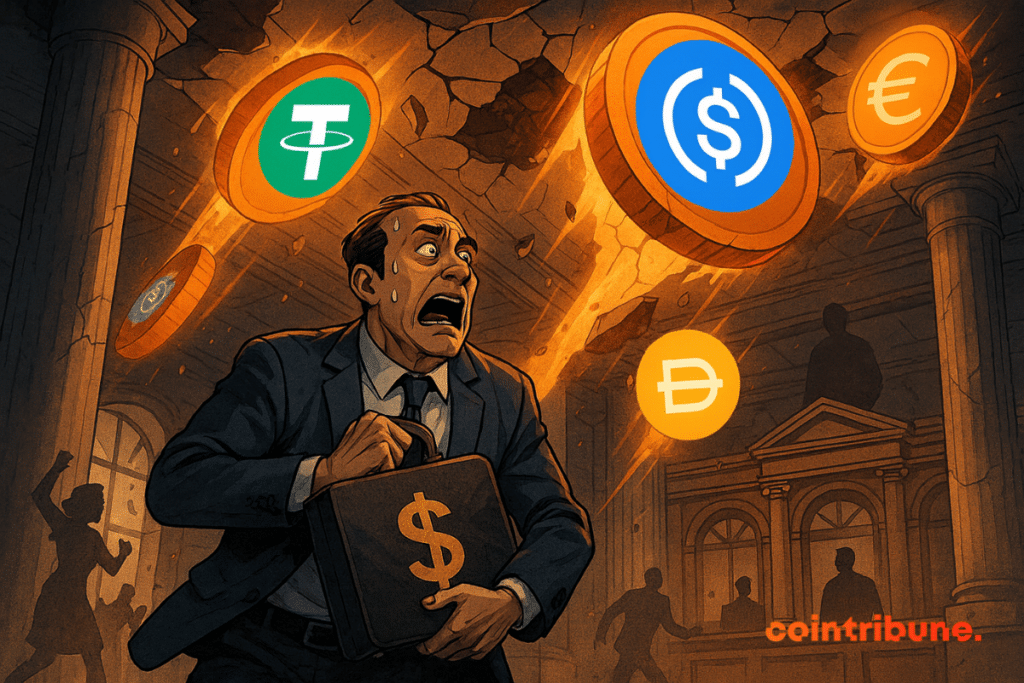Will stablecoins kill banks? Here is what Coinbase thinks
The advent of stablecoins raises questions. Are they a simple payment innovation or an existential threat to traditional banks? Their market continues to grow, already exceeding two trillion dollars in transactions in 2024. In this context, Coinbase offers a clear answer: the idea that stablecoins drain bank vaults is a myth. But the narrative battle between banks and crypto players is only beginning.

En bref
- Coinbase debunks the “myth” that stablecoins are draining US bank deposits.
- Half of all stablecoin transactions in 2024 took place outside the US.
- Banks collect $187 billion each year in card payment fees.
- $3.3 trillion in bank deposits sit idle at the Fed, generating $176 billion in interest.
When banks wave the scarecrow of siphoned deposits
American banks talk of systemic risk: according to them, stablecoins, whose market is estimated at $301 billion, would drain deposits and weaken credit. A report from the Treasury Borrowing Advisory Committee even mentions up to $6 trillion in fleeing deposits. Coinbase dismantles this calculation, reminding that the same report only anticipates $2 trillion market cap for stablecoins by 2028. The equation does not hold.
For the exchange, stablecoins are not savings accounts, but payment tools. Paying an Asian supplier in stablecoins is not a withdrawal of savings, it’s just avoiding a slow and costly transfer. Most transactions actually occur outside the United States: of the two trillion processed in 2024, one trillion circulated in Asia, Latin America and Africa.
In its report, Coinbase emphasizes:
Stablecoins do not threaten credit — they offer a competitive alternative to the $187 billion in annual bank revenue from card fees. The institutions waving the specter of “ systemic risk” today are the same ones pocketing tens of billions from card processing fees, which stablecoins could entirely bypass.
Crypto, stablecoins and banks: a fight for $187 billion
Behind the gloss of the debate lies a commercial war. American banks collect about $187 billion a year in card fees. Meanwhile, stablecoins enable fast, 24/7 payments without going through these channels. No wonder Wall Street is sounding the alarm.
Coinbase also highlights the contradictions of the banking sector. If deposits were missing, interest rates would climb. Instead, banks prefer to park $3.3 trillion at the Fed, earning $176 billion in interest in 2024, rather than lend more. The real issue is not credit, but defending juicy margins.
Some figures that change the perspective
- $2 trillion in stablecoin transactions in 2024;
- $1 trillion processed outside the United States;
- $3.3 trillion in dormant bank deposits at the Fed;
- $187 billion in annual fees generated by bank cards;
- $176 billion in interest earned by banks thanks to reserves.
This frontal opposition illustrates a clash of models: open crypto innovation versus protected banking rent. Crypto industry associations call on Congress to support competition, via the GENIUS Act, rather than enshrine the dominance of historical players.
The future of global payments could be decided in this battle: protecting bank profits or strengthening the role of stablecoins. If the United States chooses a permissive path, Europe seems to be heading in the opposite direction. Faced with the rise of foreign stablecoins, Christine Lagarde recently promised to toughen her stance so that the Old Continent can take back control.
Maximize your Cointribune experience with our "Read to Earn" program! For every article you read, earn points and access exclusive rewards. Sign up now and start earning benefits.
La révolution blockchain et crypto est en marche ! Et le jour où les impacts se feront ressentir sur l’économie la plus vulnérable de ce Monde, contre toute espérance, je dirai que j’y étais pour quelque chose
The views, thoughts, and opinions expressed in this article belong solely to the author, and should not be taken as investment advice. Do your own research before taking any investment decisions.